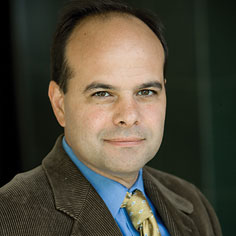
Navigating Your Genes to Health
Alumnus Dietrich Stephan makes it personal
Dietrich Stephan (S’91) is not afraid to dream big—although realizing his grandest vision is going to mean searching for answers at the smallest imaginable level.
 The human geneticist and biotech entrepreneur has spent the last 15 years at the forefront of the genomics revolution, working to unravel the root causes of common illnesses such as cancer and Alzheimer’s disease to develop better diagnostics and therapies.
The human geneticist and biotech entrepreneur has spent the last 15 years at the forefront of the genomics revolution, working to unravel the root causes of common illnesses such as cancer and Alzheimer’s disease to develop better diagnostics and therapies.
His scientific journey began as a young child growing up in Pittsburgh, when he lost his mother to breast cancer in her early thirties.
“The physician saw a lump and told her to come back the next year, but by that time, the cancer had metastasized throughout her body,” Stephan recalls. “Her death seemed like such a waste, and it put me on this track of trying to figure out how to diagnose diseases early so you can treat them more effectively.”
After completing his undergraduate degree in the Department of Biological Sciences at Carnegie Mellon, Stephan earned his Ph.D. in human molecular genetics at the University of Pittsburgh and then held faculty appointments at Johns Hopkins University and the National Human Genome Research Institute.
He credits his studies at Carnegie Mellon with giving him a strong foundation in the biological sciences, complemented with rigorous, multidisciplinary studies in computer science, mathematics and physics. “At the time I didn’t see the applied benefits of everything I was learning,” he says. “But it definitely gave me the nuts and bolts to get into the career I’m in now.”
In 2002, Stephan helped launch the Translational Genomics Research Institute— known as TGen—in Phoenix with the goal of translating advances in molecular biology into smarter, better medical care. The nonprofit research center seeks to bridge the gap between genomic discoveries made at the lab bench and the clinical applications of those findings that can take years to reach the patient bedside.
“I went out into the desert to start this big genome institute that would shorten that time window,” Stephan says. “It’s a mission that really resonated with me because of my family history.”
During a sabbatical from TGen, Stephan set his sights on Silicon Valley, where he co-founded Navigenics Inc., which provides personal genetic testing services directly to consumers. The company analyzes DNA extracted from saliva for risk markers that may predispose to dozens of health conditions such as breast and colon cancer, obesity and type 2 diabetes—and then advises patients on how to take steps toward prevention.
“We are really making use of the information from the Human Genome Project to improve health,” says Stephan, Navigenics’s chief science officer. “It was also immensely valuable for me as an academic scientist to learn how things work on the commercial side of the fence.”
At TGen, Stephan learned how to move genomic-based disease research into the clinic as rapidly as possible. At Navigenics, he helped develop the tools needed to do individual genetic testing and deliver the results in a private and secure way.
Now Stephan hopes to combine this experience in his most visionary project yet—and make the promise of personalized medicine a reality.
This fall he aims to break ground on a $250 million research institute outside Washington, D.C. focused on how to tailor medical care to an individual’s DNA. Nearly 500 scientists at the Ignite Institute for Individualized Health will probe the molecular underpinnings of disease, in the process discovering new drugs, devices and diagnostic tests that can be customized for a patient’s unique genetic profile.
By screening for genetic predisposition to disease and managing that risk earlier in life, he believes it will be possible to keep people healthy longer, thereby achieving cost savings that could in turn be used to insure more people. In other words, using genomic tools for the prevention and early detection of disease in individuals could drive efficiency into the nation’s entire healthcare system, according to Stephan, who anticipates the nonprofit center will be fully operational within five years.
“The whole goal here is to make a really big impact on chronic disease on a population-wide level and bring about healthcare reform by changing the medical paradigm from reactive and generalized to proactive and personalized,” he says.
It’s an ambitious dream, but Stephan feels he owes it to the memory of his mother—and to the millions of other families suffering from preventable losses—to make it come true.